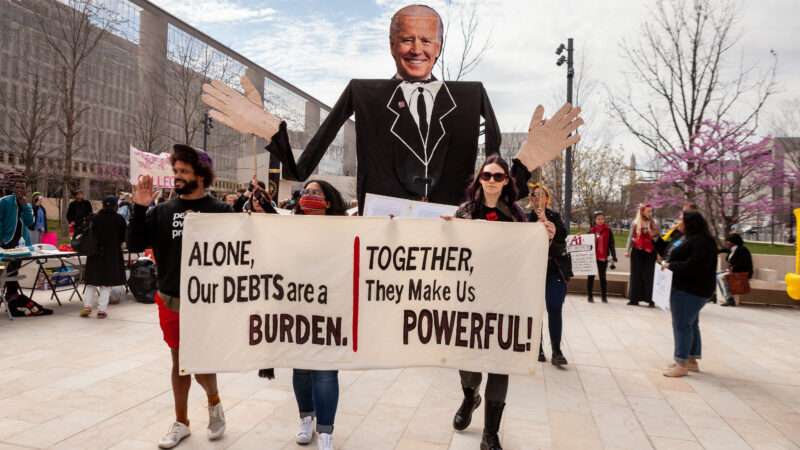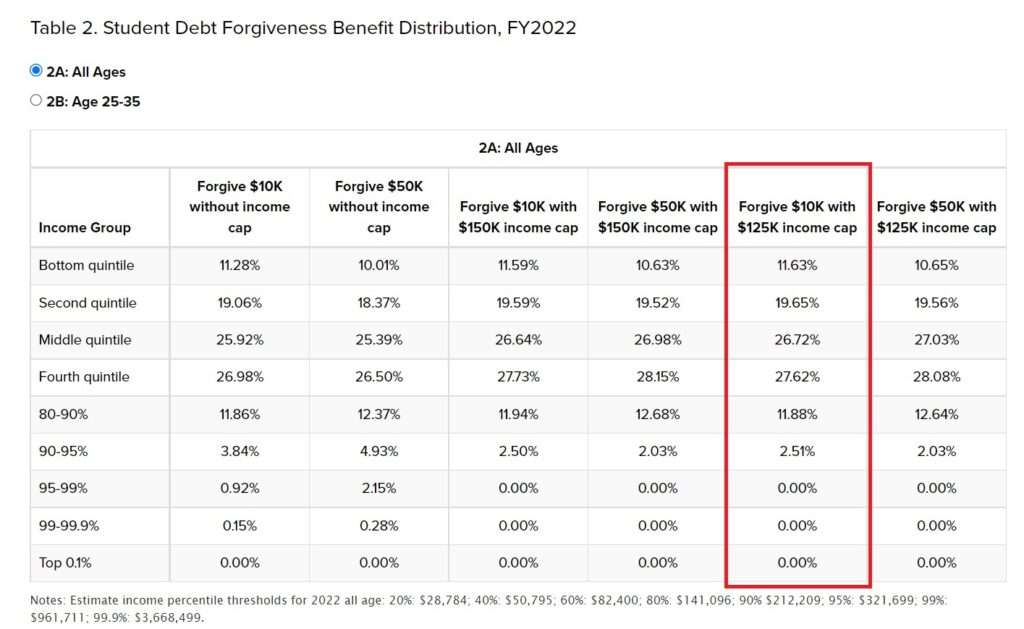
Americans earning well over six-figure incomes would be eligible for a student debt forgiveness plan that President Joe Biden is reportedly set to unveil later this week.
Perhaps unsurprisingly, that means most of the benefits of the roughly $300 billion proposal would flow to wealthier American households, according to a new analysis of the proposal.
Biden and top White House officials have been promising action on student debt for months, and CNN reported Monday that an announcement is likely coming on Wednesday. Reportedly, the White House will announce plans to forgive up to $10,000 in student debt for Americans earning up to $125,000 this year—though important specifics about the plan, like whether it would be a one-time event or an ongoing entitlement, remain unclear.
Because the poorest Americans generally don't have college degrees or the student debt that often accompanies them, the benefits of just about any student loan forgiveness program are likely to flow primarily to middle- and upper-income households. Placing income-based limits on who benefits is one way to prevent a student debt forgiveness effort from being a massive giveaway to the wealthiest Americans.
Nevertheless, according to a newly published analysis from the Penn Wharton Budget Model, a fiscal policy think tank based at the University of Pennsylvania, "about 70 percent of debt relief accrues to borrowers in the top 60 percent of the income distribution" even after limiting the benefits to individuals earning less than $125,000 this year.
As you can see from Penn Wharton's analysis, drawing different lines regarding eligibility or setting different amounts to be forgiven doesn't change the fact that wealthier-than-average households stand to benefit the most from student loan forgiveness plans.

If Biden's student loan forgiveness plan is a one-time arrangement, the Penn Wharton analysis pegs the cost at $297 billion. In other words, it would consume just about all of the supposed "deficit reduction" measures included in the recently passed Inflation Reduction Act, which is supposed to reduce the federal budget deficit by about $300 billion over the next decade. So much for that.
If the student loan forgiveness program becomes an ongoing part of the federal budget, it would cost an additional $3 billion to $4 billion annually. Costs will grow if the income-eligibility level rises or if larger amounts of debt are forgiven.
With America already on pace to run a $15 trillion deficit over the next 10 years, it's hard to justify a massive handout to middle- and upper-income households as a matter of fiscal policy.
And there are plenty of other reasons why student loan forgiveness makes little sense. As Reason's Emma Camp has detailed, student loan forgiveness programs manage to be unfair to graduates who paid back what they borrowed while also making it harder to solve the actual underlying problem of providing easy loans to students who are unprepared for college (and, therefore, unlikely to be able to pay off the burden they accrue at a young age).
In fact, it might cause the exact opposite to happen.
"If student loan debt forgiveness is ongoing, students might eventually reorganize their financing toward additional borrowing," the Penn Wharton Budget Model analysis concludes. "Moreover, more students might choose to attend qualifying education providers, including students who might otherwise have a harder time with repayment. The inclusion of these two effects could, to some extent, make the program a bit more progressive while increasing budgetary costs."
And there could be one additional foreseeable consequence: "Some of the benefit from debt forgiveness might be captured by colleges themselves in the form of higher prices (both tuition and net)."
The Biden administration has already taken steps to forgive huge amounts of student debt from some borrowers. As Reason's Mike Riggs reported last year, the Department of Education has erased about $9.5 billion owed by about 563,000 borrowers who attended for-profit schools or are disabled.
That's historic, but it's not good enough for the progressive activists who are demanding more from the White House on this front. Indeed, some of those activists are already claiming that Biden's plan to forgive only $10,000 in debt per borrower is not enough.
Canceling $10,000 in student debt when the average white borrower is $12,000 in debt, while Black women hold on average over $52,000 isn't just unacceptable, it's structural racism.
— Nina Turner (@ninaturner) August 23, 2022
The idea that taxpayers—including college grads who paid back what they borrowed—should have to finance a $10,000 giveaway to Americans earning more than six figures is absurd on its face. Well-paid professionals do not need welfare, and it makes little sense to blow another $300 billion hole in the federal budget to provide it to them.
The post Biden Reportedly Set To Forgive $10K Student Debt for Americans Earning Over Six Figures appeared first on Reason.com.







